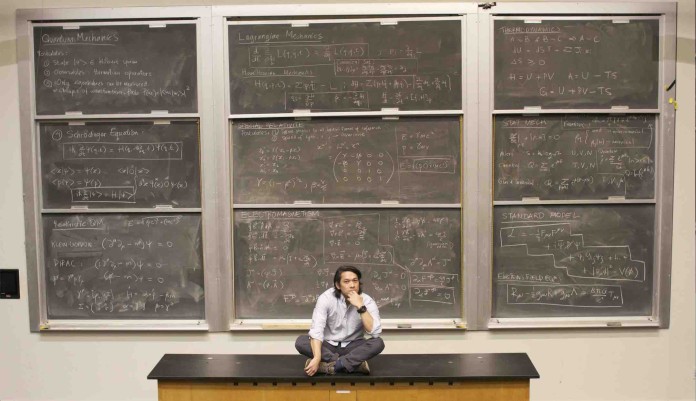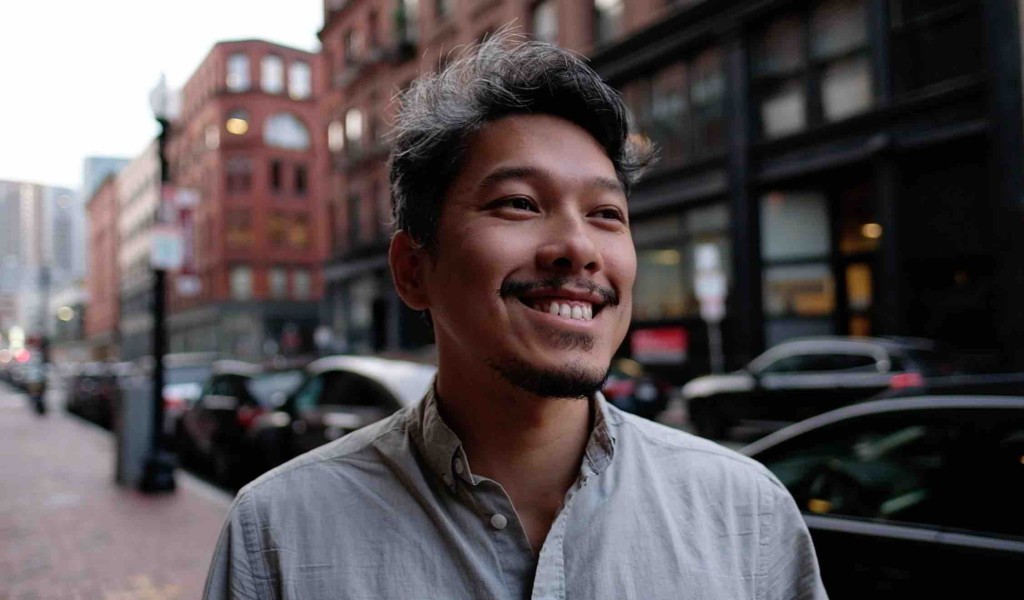I met Rizki when I came to Brown University to study Computer Science. He had just finished his BSc Honours degree in Physics at the University of Sydney and had come to Brown to pursue a PhD in Experimental Particle Physics. Great timing, I thought, as the Higgs Boson particle had just been discovered earlier that year, and the physicists who worked on it received the Nobel Prize in Physics 2013. As I later found out, Rizki is the ex-guitarist of Alexa, a famous pop band in Indonesia. You might remember them from their hit song Jangan Kau Lepas which was released in 2008. If you stop at 00:40 you’ll see Rizki front and center, jamming on his guitar!
Finding out that he was a professional musician turned physicist really piqued my interest. After all, how many people do you know made such a drastic career change? As I found out, it’s not that his interest in Physics came out of nowhere—Rizki spent some time at the University of Sydney where he graduated with a double major Bachelor’s degree in Physics and Math (and almost did a minor in Philosophy too!). Though he completed an undergraduate degree in Physics, he admitted that even throughout high school, and continuing into his undergrad days, he had always wanted to do music. “Ya, sebenernya lucu juga sih, gue ngambil fisika matematik karena suka aja. Justru gak kepikiran jadi fisikawan. Gak kepikiran, what can you do with physics and math? I don’t know, I just liked it. I took it, I absolutely enjoyed it, that’s that. Trus main musik.” (“Well, it’s actually pretty funny, I took physics and mathematics because I liked it. I didn’t actually think about becoming a physicist. I never thought, what can you do with physics and math? I don’t know, I just liked it. I took it, I absolutely enjoyed it, that’s that. And then I played music.”)
But, why would anyone make such a drastic career change from music to academics, especially after a successful stint in the former? According to Rizki, even though he really enjoyed being a musician, he didn’t see himself doing music his whole life. He felt that a successful and long-lived career in music involved business, and he never saw himself as a business person. “I was satisfied with the experiences I had, even though it was short, but it wasn’t short at all! In music, a lot happens in 3 years.” At university, your time is marked by how many semesters and years you’ve completed, but in the music industry, your time is marked by how many albums you’ve released. “After the first album, second album, then the third album…I wanted to continue the academic side of me.”
In deciding the next phase of his life, he looked into what he could do with his degree in physics. The opportunity to do a PhD jumped to him, as it’s an avenue for him to do two of the things that he loves: teaching and learning more physics. On top of that, it’s also paid work. It’s not traditionally thought of as one, as most people pursue a PhD and treat it as a foot in the door into the world of academia, but it is technically an open position at a university. For him, it meant that he gets to continue doing something he likes doing, and he gets to do it at an institution that he knows is really good in the US. On top of that, Rizki also got to travel quite a bit around Europe and the US (he spent half his time at Brown, and the other half between CERN in Geneva, Switzerland, and Fermilab, in Illinois), and also go to a lot of different conferences. “I get paid to do that. It’s a good deal. Obviously, it’s not easy, takes a lot of work and effort, and many stresses involved. But that’s why I did it.”

Though he really enjoyed his PhD, he admits that committing to a PhD takes a lot of dedication. It’s a job, but it’s not a regular 9 to 5 job. It’s one that’s highly demanding and requires a lot of commitment, not just in terms of energy, but also time. Rizki stresses that his decision to do a PhD didn’t come lightly, and suggests others considering a PhD to make sure they know what they’re getting themselves into. “I cannot stress this enough—you need to be well supported mentally. You need to be in a good place mentally in order to have a good chance of succeeding. Many people succeed of course, but many people don’t.”

Even though it was hard and stressful at times, you can tell that Rizki really enjoyed his PhD. It’s a very interesting life story – certainly not one that many people go through. At the end of our conversation, I asked him if, knowing what he knows now, he would change anything in the past, and without hesitation, he explained, “I wouldn’t change anything in the past. Things happened the way they should. I think so! … if I didn’t do music, I would’ve missed out on those experiences. It’s an experience of a lifetime I would say. Then again … if I didn’t do music, I would probably be a professor by now. That could also be interesting, but I wouldn’t have a music background. That’s my past, so I’ll embrace it. So yeah, no regrets. I wouldn’t say anything different to my older self.” Well said!
So, what would be his advice for anyone interested in pursuing a different career? “Know in advance the consequences of your actions.” For himself, he made sure he invest a lot of time into understanding what it would mean to be a PhD candidate in Physics and the impacts on his career. For Rizki, this applies to everything, not just for drastic life changes. It’s Rizki’s own personal philosophy, one he always practices. “Except for some things, like when I started taking physics without knowing exactly what I wanted,” he quipped. Well, fortunately, it turned out really well!
This article was written by Indira Pranabudi and edited by Azira Tamzil. Featured in this article is Rizki Syarif. Here he is in his own words:
I did my PhD in experimental particle physics at Brown University. I had been working with data produced by the Large Hadron Collider at CERN, Switzerland, in search for new hypothetical particles. Prior to that, I was a mathematics and physics major at the University of Sydney, Australia. In between, I was a guitarist of the Indonesian pop rock band “Alexa”. I am generally curious about many things, and I try to learn as many things as I can. I’ve traveled a lot. And I enjoy discussing philosophy, current events, cultural and technological developments in society.











[…] (Tasya Kamila, Maudy Ayunda, Alyssa Soebandono, Surya Sahetapy, GKR Hayu, Alanda Kariza, Rizki Syarif ex-ALEXA, and Dimas Muhamad to name a few) and hear firsthand about their inspiring […]